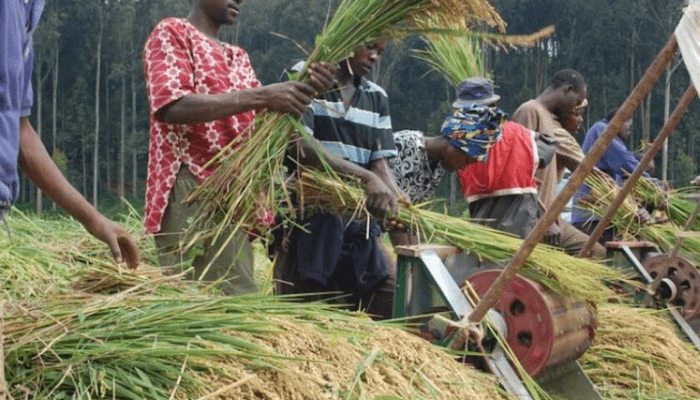Tags
AfDB, Sasakawa Africa train rice farmers on improved yields, soil fertility

An African Development Bank (AfDB) funded project, implemented by the Sasakawa Africa Association (SAA) in Nigeria and Benin Republic, has trained farmers in Nasarawa State on new technologies to improve rice production and maintain soil fertility.
The project, which is being implemented under AfDB’s Policy and Human Resource Development Grant (PHRDG 1), becomes imperative due to the impact of climate change on food production.
Sasakawa Africa Association (SAA) is an international non-profit organisation.
Godwin Atser, the Country Director, (SAA), said during the Field Days training exercise for farmers in Lafia and Doma Local Government Areas of the State.
Atser explained that the project was designed to expose farmers to new technologies and best agronomic practices in rice production that would increase their yield and also maintain the soil health, thereby preserving its nutrients sustainably for a very long period of time.
He noted that climate change had made it a bit difficult for farmers to predict rain pattern, which impacts negatively on their production.
“What we are doing with the project is to showcase to farmers how they can have good yield from their rice farms and secondly, how to improve the soil nutrients and sustain it beyond their generation.
“If we are not careful, a time will come when the soil will lose its fertility, so we need to see how we can maintain the soil fertility,” he said.
He said that the technology and best agronomic practices, if adequately maintained, would help farmers to minimize input in the farm, maximise profit and as well reduce impact of climate change.
Also, Ibrahim Fagge, Coordinator, Renerative Agriculture (SAA) said that, the technologies introduced to the farmers included improved rice seed (faro 66), production of organic fertiliser from rice husk knowns as “Biochar,” and “Bokashi” from decomposed food waste.
Fagge explained that the Biochar is made from burning rice husk in heat without oxygen and when mix with the soil during land preparation, improves its texture, nutrients and water retention capacity.
He said that the farmers were taught how to make the Biochar, how to prepare their fields and well as application of fertiliser.
According to Fagge, the farmers are discouraged from broadcasting fertiliser in their farms in order to reduce greenhouse gas emission and its attendant impact on climate change.
“Fertilisers, when exposed through broadcasting in the farm emit harmful chemical substances that contribute to the depletion of the ozone layer.
“Therefore, under this project, the farmers were taught on Urea Deep Placement (UDP), where the bury the fertiliser in-between the rice planted in lines on the field,” he said.
Also, Idris Garko, Facilitator of the PHRDG 1, said the project was being implemented in seven communities across Doma and Lafia Local Government Areas of Nasarawa State.
According to Garko, the farmers were taught how to prepare nursery beds for the rice, transplant to their prepared fields after 15 days in rolls with a 20cm gap between the plant.
He added that, the process of nurseries and transplanting reduces wastage of rice seeds compared to the usual practice of broadcasting.
Garko also said, the UDP application of fertiliser makes for precision rather than broadcasting that could also contribute to fertilising the weeds in the farm.
https://businessday.ng/news/article/afdb-sasakawa-africa-train-rice-farmers-on-improved-yields-soil-fertility/Published Date: April 27, 2024






